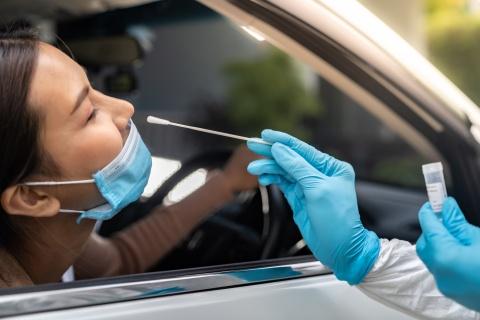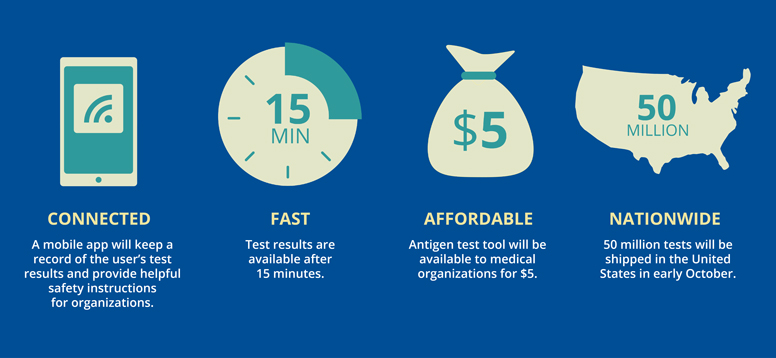
Photo above: A new rapid COVID-19 test uses a less invasive nasal swab and produces results within 15 minutes
An early diagnosis of COVID-19 infection enables healthcare providers to treat patients as quickly as possible before symptoms become severe while at the same time isolating patients to prevent viral spread in the community.

Limkakeng Jr., Associate Professor, Division of Emergency Medicine
“We've known from the beginning that patients are able to spread infection very early on, even before they have symptoms,” says Dr. Alexander T. Limkakeng Jr., Associate Professor, Division of Emergency Medicine. “The ability to detect someone who has infection so that they can isolate and prevent from spreading the infection is critical to the overall pandemic response.”
At the onset of the COVID-19 pandemic, Duke Emergency Medicine partnered with Abbott Technologies as one of 19 sites within the United States to evaluate a rapid COVID-19 test that provided results within 15 minutes. On August 26, the U.S. Food and Drug Administration (FDA) approved the rapid COVID-19 test for Emergency Use Authorization based on preliminary results of the study. Approximately 50 million tests will be shipped out a month to healthcare facilities beginning in October.
About the size of a credit card, the antigen test tool uses a patient’s nasal swab sample, a less invasive type of collection method than the current nasopharyngeal swab used in the majority of COVID-19 tests.
“It's a nasal swab test, and the difference in that is that many of the tests currently require what's called a nasal pharyngeal swab, which is a slide that goes further back into the nose and into the pharyngeal cavity, which is obviously a little uncomfortable and for many people, very uncomfortable,” says Dr. Limkakeng, Duke site principal investigator.

In contrast to current COVID-19 PCR tests that require laboratory processing to detect viral RNA, the rapid test identifies the SARS-CoV-2 viral antigen right at the patient’s bedside. This highly accurate test has a sensitivity of 97.1% and a specificity of 98.5%. The antigen test is also highly affordable: Abbott plans to sell the test for five dollars. Test results will be available via a mobile app for faster turnaround times and hands-free viewing. Because the antigen test will be distributed on a massive scale in the United States, it may serve as a key strategy to control the pandemic.
Dr. Limkakeng says this was an unprecedented team effort to launch the trial and enroll patients in the emergency department as fast as possible. Team members in the contracting and regulatory department, the Duke IRB, regulatory support, clinical research administration, and clinical research coordinators answered the call.
“What was remarkable about this study was that the timeframe in which all the elements of the Duke research infrastructure were able to focus and prioritize this study to make it happen,” he says. “I received the first email from the study principal investigator on May 1, and we were enrolling by June 1, which is really unprecedented.”
Dr. Limkakeng says the study is ongoing and they expect more data as they enroll over 1,000 patients in the study, including at least 120 patients who are positive for COVID-19 infection.
Give to Duke Surgery
A gift to the Department of Surgery is a gift of knowledge, discovery, and life.